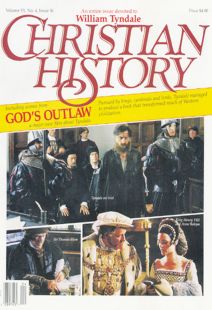From the Archives: Dear King Henry, . . .
This is a letter from Vaughan, the king’s agent, to his master and commissioner, King Henry Vlll himself, regarding one of the conversations that Vaughan had with Tyndale while he was trying to persuade the translator to return to England from Europe. Note the apparent respect that Vaughan had for Tyndale, and the apparent respect that Tyndale had for the king, albeit he had greater respect for the Scriptures.
I have again been in hand to persuade Tindal [a common spelling of the reformer’s name in that day]; and, to draw him rather to favor my persuasions, and not to think the same feigned, I showed him a clause contained in Master Cromwell’s letter, containing these words: “And notwithstanding the premises in this my letter contained, if it were possible by good and wholesome exhortation to reconcile and convert the said Tindal from the train and affection which he now is in, and to extirpate and take away the opinions and fantasies forcely rooted in him, I doubt not but the king’s highness would be much joyous of his conversion and amendment. And so, being converted, if then he would return into his realm, undoubtedly the king’s royal majesty is so inclined to mercy, pity and compassion that he refuseth none which he seeth to submit themselves to the obedience and good order of the world.”
In these words, I thought to be such sweetness and virtues as were able to pierce the hardest heart of the world, and as I thought, so it came to pass; for after sight thereof, I perceived the man to be exceedingly altered, and to take the same very near unto his heart, in such wise that water stood in his eyes, and he answered:
“What gracious words are these! I assure you,” said he, “if it would stand with the king’s most gracious pleasure to grant only a bare text of the Scriptures to be put forth among his people, like as is put forth among the subjects of the emperor in these parts, and of other Christian princes, be it the translation of whatsoever person shall please his majesty, I shall immediately make faithful promise never to write more, nor abide two days in these parts after the same; but immediately repair unto his realm, and there most humbly submit myself at the feet of his royal majesty, offering my body to suffer whatever pain or torture, yea, whatever death his grace will, so [long as] this be obtained. And till that time, I will abide the aspersions of all the chances, whatsoever shall come, and endure my life in as many pains as it is able to bear and suffer. And as concerning my reconciliation, his grace may be assured that, whatsoever I have said or written, in all my life, against the honor of God’s Word, and [if that be] proved, the same shall I, before his majesty and all the world, utterly renounce and forsake, and with most humble and meek mind embrace the truth, abhorring all error soever sooner at the most gracious and benign request of his royal majesty, of whose wisdom, prudence and learning I hear so great praise and commendation, than of any other creature living. But if those things which I have written be true, and stand with God’s Word, why should his majesty, having so excellent a guide of knowledge in the Scriptures, move me to do anything against my conscience?”
[And so he continued] with many other words which were too long to write. Finally, I have some good hope in the main, and would not doubt to bring him to some good point, were it that something now and then might proceed from your majesty toward me, whereby the man might take the better comfort of my persuasions.
I advised the same Tindal that he should not put forth the same books till your most gracious pleasure were known, whereunto he answered that mine advisement came too late, for he feared lest one that had his copy would put it very shortly in print, which he would hinder if he could; if not, there is no remedy. I shall stay it as much as I can; as yet it is not come forth, nor will not in a while, by that I perceive.
By Stephen Vaughan
[Christian History originally published this article in Christian History Issue #16 in 1987]
Next articles
From the Archives: From The Obedience of a Christian Man
William Tyndale’s account of what it means to follow Christ.
William TyndaleWilliam Tyndale: Recommended Resources
Where to find more information about William Tyndale and his times.
the EditorsWomen in the Early Church: From the Publisher
Introduction to Women in the Early Church and a looks at Christian History's point of view.
the EditorsOther Women of the Early Church: Special Gallery Section
Who was who among women (real and fictional) in the early church.
Mary L. Hammack and the Editors



